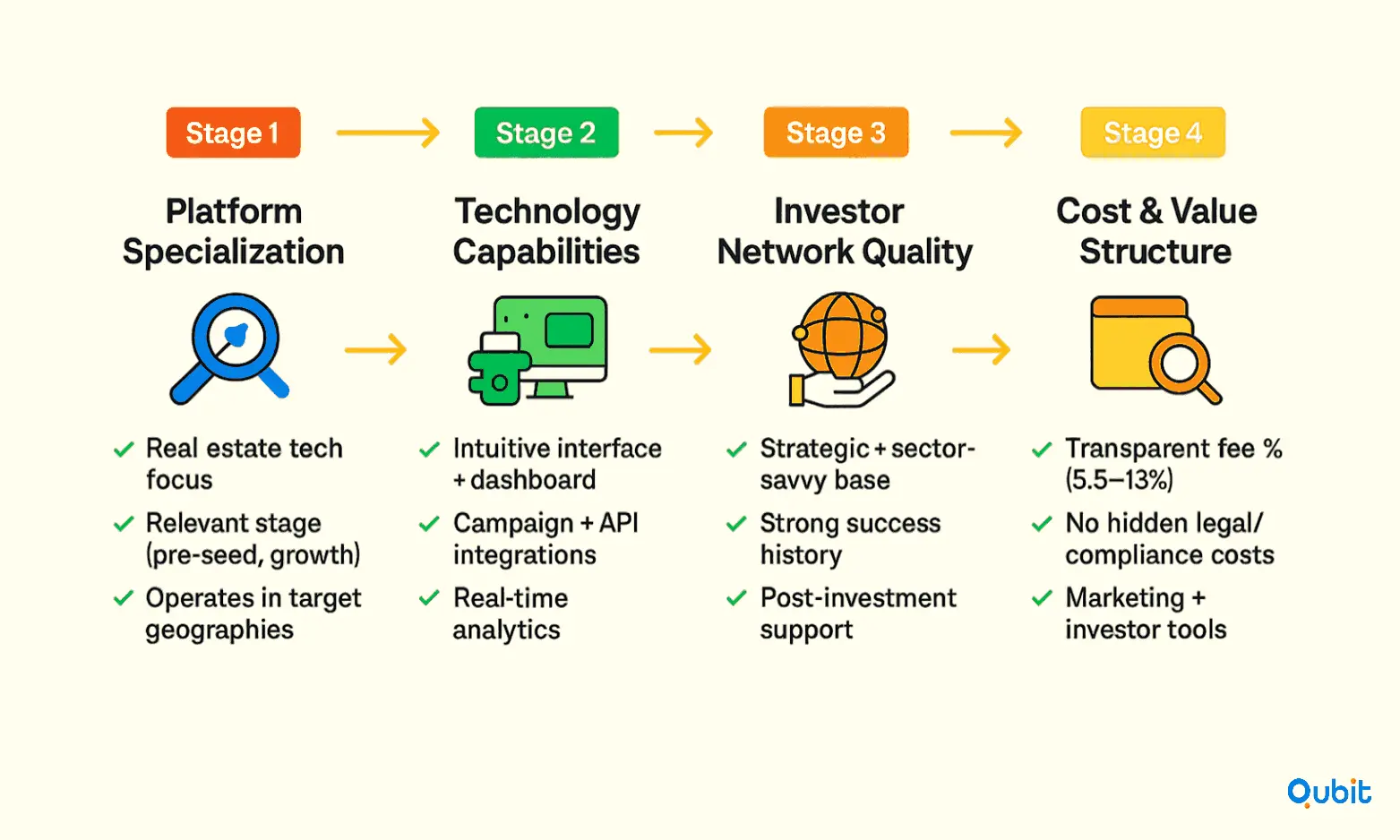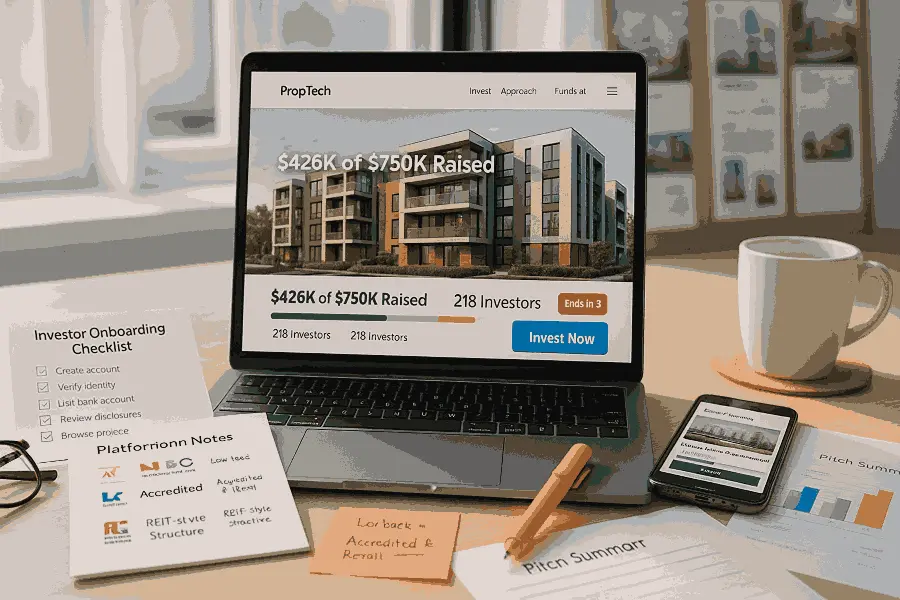Global crowdfunding is projected to reach $5.43 billion by 2033, growing from $1.45 billion in 2024 at a compound annual growth rate of 15.82%. Within this landscape, PropTech-focused equity crowdfunding platforms are emerging as specialized solutions that understand the unique challenges and opportunities within real estate technology.
These purpose-built platforms bridge the gap between innovative PropTech startups seeking growth capital and investors looking to participate in the digital transformation of the world's largest asset class. By combining deep real estate domain expertise with sophisticated technology infrastructure, they're reshaping how PropTech companies access funding and how investors participate in real estate innovation.
Understanding Equity Crowdfunding for PropTech
Equity crowdfunding allows PropTech startups to raise capital by selling shares to a large number of investors, typically through online platforms. Unlike traditional venture capital, equity crowdfunding platforms can utilize proptech and provide a range of vetted real estate investment opportunities that enable property developers and construction companies to raise money from everyday retail investors.
Types of PropTech Equity Crowdfunding
Direct Equity Crowdfunding: Startups sell shares directly to investors through platforms like StartEngine, Crowdcube, EquityMultiple or BrickSave. This model allows PropTech companies to maintain control while accessing diverse investor networks.
Real Estate Project Crowdfunding: PropTech platforms themselves raise capital for specific real estate projects or developments, leveraging their technology to improve investment transparency and management.
Tokenized Equity: Advanced platforms use blockchain technology to create tokenized shares, enabling transparent ownership and trading while automating compliance processes, cap table management, and dividend distributions.
Market Opportunity
The PropTech sector presents compelling investment opportunities, with platforms designed to democratize access to real estate investment, allowing individuals to invest in vetted, high-quality projects at a smaller ticket. Recent success stories include AI-powered proptech Prop-AI securing $1.5 million pre-seed funding, demonstrating strong investor appetite for innovative real estate technology solutions.
Key Features of PropTech-Focused Crowdfunding Platforms
Purpose-built PropTech crowdfunding platforms offer specialized features that address the unique needs of real estate technology startups and investors. These platforms go beyond generic crowdfunding solutions to provide industry-specific tools and expertise.
Technology Infrastructure
AI-Powered Investment Matching: Advanced platforms leverage artificial intelligence to match PropTech startups with suitable investors based on portfolio preferences, risk tolerance, and investment thesis alignment.
Blockchain Integration: Leading platforms implement blockchain technology for secure transactions, transparent ownership records, and automated compliance processes. This technology enables immutable ownership records while creating standardized compliance protocols.
Real-Time Analytics: Investors gain access to real-time project progress, budget utilization, and projected returns rather than waiting for quarterly report, building trust and facilitating better decision-making.
Due Diligence and Vetting
PropTech-Specific Due Diligence: Platforms employ experts with deep real estate and technology backgrounds to evaluate startups based on market potential, technology scalability, and regulatory compliance.
Market Validation Tools: Specialized platforms provide risk assessment functionality and tools that help investors predict project success considering factors such as market fluctuations, economic downturns, and property-specific risks.
Regulatory Compliance: Purpose-built platforms ensure regulations-friendly operations with KYC/AML integrations and USA & EMEA coverage to meet complex real estate and securities regulations.
Investor Experience
Professional Interface: Modern platforms offer professional, modern and easy to use interfaces that allow retail and institutional investors access the alternative investment market while providing comprehensive PropTech market intelligence.
Portfolio Management: Investors can build diversified PropTech portfolios with adaptable pricing plans that cater to different investor needs and preferences and integrated portfolio tracking tools.
Educational Resources: Specialized platforms provide PropTech market insights, trend analysis, and educational content to help investors make informed decisions in this complex sector.
Benefits for PropTech Startups
Equity crowdfunding platforms designed for PropTech offer significant advantages over traditional fundraising methods, addressing the unique challenges faced by real estate technology companies.
Access to Specialized Capital
Industry-Savvy Investors: PropTech-focused platforms attract investors with real estate and technology expertise who understand the sector's unique challenges and growth potential.
Diverse Funding Sources: Startups can access capital from retail and institutional investors simultaneously, reducing dependence on traditional VC funding cycles.
Strategic Partnerships: Many platforms facilitate connections between startups and potential strategic partners, including real estate developers, brokerages, and financial institutions.
Streamlined Fundraising Process
- Efficient Documentation: Purpose-built platforms provide financial review and legal documentation necessary to launch compliant fundraising campaigns, reducing legal costs and timeline.
- Market Validation: The crowdfunding process itself serves as market validation, demonstrating investor demand for the PropTech solution.
- Brand Building: Successful campaigns build brand awareness within the PropTech ecosystem and establish credibility with industry stakeholders.
Flexible Funding Options
- Regulation Crowdfunding (Reg CF): Startups can raise up to $5 million through Regulation Crowdfunding, providing substantial growth capital.
- Convertible Instruments: Many platforms support convertible notes or SAFEs for early-stage startups without established valuations.
- Growth Capital: Later-stage PropTech companies can access larger funding rounds for expansion and scaling operations.
Benefits for Investors
PropTech-focused equity crowdfunding platforms provide investors with unprecedented access to real estate technology investment opportunities previously available only to institutional investors.
Portfolio Diversification
Real Estate Technology Exposure: Investors gain exposure to the digital transformation of real estate without requiring direct property ownership or traditional real estate investment minimums.
Geographic Diversification: Cross-border activity now accounts for 17% of all crowdfunding investments in the EU, enabling investors to access international PropTech opportunities.
Stage Diversification: Platforms offer investment opportunities across different PropTech development stages, from early-stage startups to growth-stage companies.
Insights from proptech strategic partnerships funding, where synergistic relationships with established real-estate entities are considered.
Transparency and Control
- Data-Driven Decisions: Advanced platforms provide comprehensive data analytics, market trends, and performance metrics to support investment decisions.
- Direct Ownership: Unlike traditional real estate funds, equity crowdfunding provides direct ownership stakes in PropTech companies with clear governance rights.
- Liquidity Options: Blockchain networks optimized for equity crowdfunding will allow investors to hold diversified portfolios of tokenized assets with improved secondary market liquidity.
Lower Investment Barriers
Reduced Minimums: Most platforms offer investment minimums ranging from $5,000 to $20,000 per deal, making PropTech investment accessible to retail investors.
Professional Management: Investors benefit from professional due diligence and ongoing portfolio management without requiring deep PropTech expertise.
Leading PropTech Equity Crowdfunding Platforms
Several platforms have emerged as leaders in PropTech-focused equity crowdfunding, each offering unique features and investment opportunities.
Specialized PropTech Platforms
EquityMultiple stands out as best for accredited investors with minimum investments ranging between $5,000 and $20,000 per deal and a focus on transparency. The platform offers both short- and long-term real estate crowdfunding opportunities designed for capital appreciation and income generation.
Republic Europe operates as a leading equity crowdfunding platform that allows investors to support startups and growth businesses by purchasing shares, formed through a 2023 merger with Seedrs and focusing on UK and European markets.
SeedBlink provides all-in-one private markets infrastructure that connects tech startups with individual and institutional investors while offering built-in equity management and post-investment governance.
Technology-Enabled Platforms
LenderKit offers bespoke equity crowdfunding software that enables the creation of platforms similar to StartEngine, Crowdcube, EquityMultiple or BrickSave with customizable features and regulations-friendly compliance.
Dacxi Chain is pioneering a transformation in global equity crowdfunding, having successfully completed the first cross-border equity crowdfunding pilot deal in April 2025, demonstrating how technology can overcome geographical limitations.
Regional Leaders
Indian PropTech Success: MicroMitti has raised Rs 90 crore in a funding round from prominent local HNIs, family offices, and influential business leaders, expanding globally with MicroMitti Inc. to attract international investors and promote cross-border collaboration.
European Growth: Gateway Ventures operates as an Austrian equity crowdfunding platform designed to connect early-stage startups with private investors, focusing on pre-seed and seed rounds.
Regulatory Considerations and Compliance
PropTech equity crowdfunding operates within complex regulatory frameworks that span both securities and real estate regulations. Understanding these requirements is crucial for both platforms and participants.
Securities Regulations
- Regulation Crowdfunding (Reg CF) allows companies to raise up to $5 million from both accredited and non-accredited investors. This regulation requires extensive financial disclosure and ongoing reporting obligations.
- Accredited Investor Requirements: Many platforms focus on accredited investors to streamline compliance while offering larger investment opportunities and more flexible terms.
- Cross-Border Compliance: Regulatory harmonization is driving cross-border growth with collaborative frameworks that allow platforms to operate across borders. However, each jurisdiction maintains specific requirements.
Real Estate Compliance
- Professional Licensing: PropTech platforms must navigate real estate licensing requirements when facilitating property-related investments or transactions.
- Property Regulations: Investments in real estate development projects must comply with local zoning, construction, and environmental regulations.
- Consumer Protection: Platforms must implement appropriate investor protection measures, including risk disclosures and suitability assessments.
Technology Compliance
- Data Privacy: Platforms should ensure that data collected is secure and compliant with data privacy regulations such as GDPR, CCPA, and HIPAA.
- Cybersecurity: Advanced security protocols protect sensitive investor information and transaction data.
- API Compliance: Integration with third-party financial services requires adherence to financial services regulations and data handling requirements.
How to Choose the Right PropTech Crowdfunding Platform
Selecting the appropriate equity crowdfunding platform requires careful evaluation of multiple factors specific to PropTech startups and their funding requirements.

Platform Specialization
- PropTech Focus: Choose platforms with deep domain expertise in real estate technology rather than generic crowdfunding platforms. Look for teams with real estate and technology backgrounds.
- Investment Stage: Select platforms that specialize in your funding stage, whether pre-seed, seed, or growth-stage investments.
- Geographic Coverage: Consider platforms that operate in your target markets and offer cross-border investment capabilities.
Technology Capabilities
- Platform Features: Evaluate user-friendly interfaces, campaign management tools, and investor portal capabilities.
- Integration Options: Look for platforms that offer payment integrations, KYC/AML integrations, and API connectivity.
- Analytics and Reporting: Choose platforms that provide comprehensive data analytics and real-time reporting capabilities.
Investor Network Quality
- Investor Base: Assess the platform's investor network, focusing on PropTech-savvy investors and strategic partners.
- Success Rates: Review historical campaign success rates and average funding amounts for PropTech startups.
- Post-Investment Support: Evaluate ongoing support services, including investor relations tools and secondary market access.
Cost Structure
- Fee Transparency: Compare platform fees, which typically range between 5.5% and 13% commission for equity crowdfunding.
- Hidden Costs: Understand all costs, including legal fees, compliance costs, and ongoing platform fees.
- Value-Added Services: Consider additional services like marketing support, investor relations tools, and strategic partnerships.
Future Trends in PropTech Equity Crowdfunding
The PropTech equity crowdfunding landscape continues evolving rapidly, driven by technological advancement, regulatory changes, and growing investor sophistication.
Technological Innovation
- AI-Powered Platforms: AI-powered investment tools are becoming standard, offering sophisticated digital marketing strategies to captivate potential investors and improve matching between startups and investors.
- Blockchain Integration: Smart contracts now automate compliance processes, cap table management, and dividend distributions while creating immutable ownership records.
- Virtual Reality: Integration of Virtual and Augmented Reality (VR/AR) technologies, enables investors to virtually tour properties and projects, improving due diligence capabilities.
Market Evolution
- Cross-Border Growth: 40% of successful equity crowdfunding campaigns would have failed without cross-border investment, driving platform expansion into international markets.
- Institutional Participation: Growing institutional investor interest in PropTech equity crowdfunding, bringing larger check sizes and sophisticated due diligence.
- Secondary Markets: Development of secondary market liquidity through tokenized assets and unified wallets for better investment liquidity.
Regulatory Development
- Regulatory Harmonization: Continued regulatory harmonization driving cross-border growth with standardized compliance protocols.
- Increased Limits: Potential increases in Regulation Crowdfunding limits and expansion of investor eligibility criteria.
- Global Standardization: Movement toward global standards for equity crowdfunding compliance and investor protection.
Your exploration of diverse funding methods is complemented by insights from the proptech fundraising guide, which frames the broader fundraising landscape for PropTech ventures.
Conclusion
Equity crowdfunding platforms purpose-built for PropTech represent a fundamental shift in how real estate technology companies access capital and how investors participate in the sector's growth. These specialized platforms combine deep real estate domain expertise with sophisticated technology infrastructure to address the unique challenges and opportunities within PropTech investment.
For PropTech entrepreneurs and investors alike, purpose-built equity crowdfunding platforms offer unprecedented opportunities to participate in and benefit from the ongoing revolution in real estate technology. Explore our Financial Model Creation service at Qubit Capital. Let’s work together to turn your vision into a success story.
Key Takeaways
- PropTech-focused platforms offer specialized features like AI-powered matching, blockchain integration, and real estate-specific due diligence
- Startups access industry-savvy investors and flexible funding options from $5,000 to $5 million through various regulatory frameworks
- Investors gain PropTech exposure with lower barriers, improved transparency, and diversified real estate technology portfolios
- Leading platforms combine technology infrastructure with deep real estate domain expertise to serve specialized market needs
- Regulatory compliance requires navigating both securities and real estate regulations with growing cross-border harmonization
- Future trends include AI-powered platforms, blockchain automation, and secondary markets with 40% of campaigns requiring cross-border investment
Frequently asked Questions
What should PropTech startups prepare before launching a crowdfunding campaign?
Essential preparation includes validating product-market fit with paying customers, developing comprehensive financial projections, ensuring regulatory compliance, creating compelling pitch materials, and building relationships with PropTech-focused investors. Startups should also prepare detailed use-of-funds plans and milestone timelines for investor transparency.






